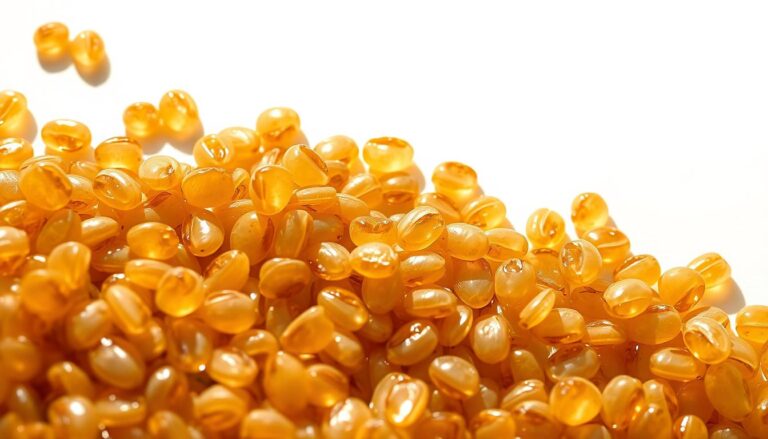Do you know the secret powers of fruit? It’s full of fiber, nutrients, and other good stuff. Eating fruit is a great choice for staying healthy.
Let’s explore why fruits should be a big part of your diet. They can really improve how you feel and your health.
Key Takeaways
- Fruit is a rich source of dietary fiber, which supports digestive health and promotes feelings of fullness.
- Fruits are packed with essential vitamins, minerals, and antioxidants that nourish the body and protect against disease.
- The natural sweetness of fruit provides a healthier alternative to added sugars and artificial sweeteners.
- Incorporating more fruit into your daily routine can help you achieve a balanced, nutrient-dense diet.
- Choosing fresh or frozen fruit offers flexibility and convenience for a variety of recipes and snack options.
The Fiber Filled Wonders of Fruit
Fruit is packed with dietary fiber, essential for good digestion and health. It comes in two types: soluble and insoluble. They both have different important roles that help our bodies in many ways.
Unleashing the Power of Dietary Fiber
Whole fruits are full of dietary fiber. This fiber type is key for regular bowel movements and feeling full. Soluble fiber, from fruits like apples and berries, can slow down sugar absorption. It also helps reduce bad cholesterol.
On the other hand, insoluble fiber, found in fresh produce, adds bulk to stool. This helps prevent constipation, an important part of a balanced diet essentials.
Exploring the World of Soluble and Insoluble Fibers
The fiber in fruits has what you need. Soluble fibers, like pectin from apples and bananas, can steady blood sugar levels. They also support heart health. Insoluble fibers, such as cellulose in whole fruits, help keep digestion regular. They play a part in keeping us from getting diseases like hemorrhoids.
Knowing the benefits of each fiber type helps us pick a variety of whole fruits for our balanced diet essentials. This choice is good for our taste buds and our health, giving us the dietary fiber we need.

Fiber is the unsung hero of a healthy diet. It’s time to celebrate the fiber filled wonders of fruit and unlock their powerful benefits.
Nutritional Powerhouses The Vitamin and Mineral Bounty
Fruit is a true nutritional powerhouse, full of vitamins and minerals. They are key for a balanced diet and good health. Fruits help in many ways, from boosting your immune system to keeping your bones strong.
Many nutritious fruits are rich in vitamin C, a powerful antioxidant. It boosts your immunity and helps make collagen. Collagen is important for keeping your skin young and vibrant. Oranges and grapefruits are packed with vitamin C, making them a great choice for your daily intake.
Fruits also shine when it comes to minerals. Bananas are known for potassium, aiding in stable blood pressure and heart health. Apples and pears are rich in boron. This mineral is vital for strong bones and prevents osteoporosis.
| Fruit | Vitamins | Minerals |
|---|---|---|
| Oranges | Vitamin C | Potassium |
| Bananas | Vitamin B6 | Potassium |
| Apples | Vitamin K | Boron |
| Blueberries | Vitamin C, Vitamin K | Manganese |
The variety of vitamins and minerals found in fruits is amazing. By eating many types of fruit every day, you give your body everything it needs to work well.
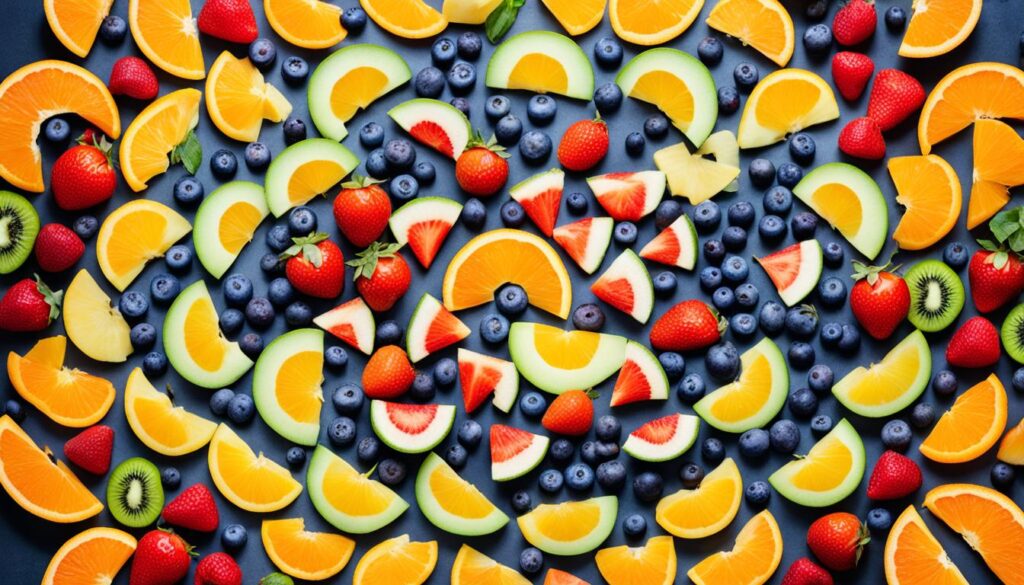
Fruit is nature’s candy, and it’s packed with essential nutrients that keep our bodies healthy and strong.
If you want to boost your immune system, have stronger bones, or just eat well, turn to nutritious fruits. They are the best choice for your health.
Fruit contains the fiber and other nutrients you need but it also contains natu
Fruit is packed with fiber, vitamins, and minerals. It’s key to know that not all sugars are bad. The ones in fruit are not like the sugars in sweets.
Fruit’s natural sweetness comes from fructose. This is a different kind of sugar, found in many fruits. Fructose is broken down in a way that’s healthier for our bodies. It also comes with fiber and lots of nutrients. These help our bodies process the sugar slowly, giving us energy steadily.
Fruit nutrition facts show that the natural sugars in fruit are okay. They’re different from the bad sugars in snacks. Eating fruit as a part of a balanced diet is good for you.
| Fruit | Fructose Content per 100g | Fiber Content per 100g |
|---|---|---|
| Apple | 6g | 2.4g |
| Banana | 12g | 2.6g |
| Orange | 9g | 2.4g |
| Strawberry | 5g | 2g |
We should learn about fruit’s natural sugars. This way, we can enjoy fruit’s sweetness without overdoing it. It’s about balance in our diet.

Antioxidant Armor Fruit’s Secret Weapon
Fruits are both tasty and good for you. They’re like a shield against free radicals. These foods are full of antioxidants. These compounds protect our cells and keep us healthy. Let’s learn about their power.
Unleashing the Power of Antioxidants
Antioxidants are key in fruit nutrition. They fight inflammation, boost our immune system, and help us age well. They stop free radicals from harming our cells. This helps prevent diseases and keeps us healthy.
Fruits have many types of antioxidants. You’ll find vitamins C and E, along with carotenoids and flavonoids. Each antioxidant does something special. Vitamin C helps our immune system. Vitamin E protects us from stress. Carotenoids are great for our eyes.
Some fruits, especially organic ones, are really high in antioxidants. Berries lead the pack, offering lots of flavonoids. Citrus fruits give us plenty of vitamin C. Including these in our diet is great for health.
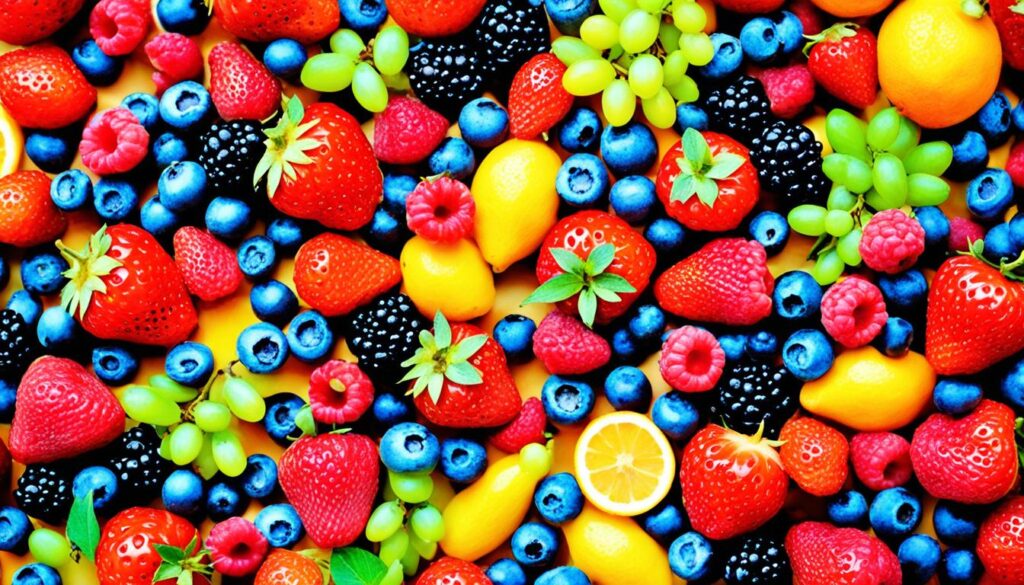
Eating a diet rich in antioxidant-rich foods, like fruits, can help neutralize free radicals and reduce the risk of chronic diseases. Dr. Sarah Johnson Nutritionist
Eating lots of antioxidant fruits is like building armor for your health. It fights oxidative stress and keeps you well. So make fruits a big part of your diet and enjoy the benefits.
The Low Calorie Crowd Pleasers
Fruit is perfect for those looking to snack healthily or keep their weight in check. They are not only tasty but also packed with goodness.
They are also low in calories. Berries, citrus fruits, and melons have under 100 calories each. This makes them great for anyone counting calories. An apple has about 80 calories. Meanwhile, a cup of blueberries is just 84 calories.
Fruits are full of vitamins, minerals, and fiber. They help you stay full and happy cutting down on eating too many high-calorie snacks. Also, their natural sweetness can stop you from craving sugary foods, offering a healthy snack option.
| Fruit | Calories per Serving | Fiber Content g |
|---|---|---|
| Apple medium | 80 | 4.4 |
| Banana medium | 105 | 3.1 |
| Strawberries 1 cup | 49 | 3.0 |
| Grapes 1 cup | 104 | 1.4 |
| Watermelon 1 cup | 46 | 0.6 |
Adding fruit to your meals and snacks is easy and beneficial. You can blend them in smoothies, mix them in salads, or enjoy them by themselves. There are many ways to eat these healthy snack options.
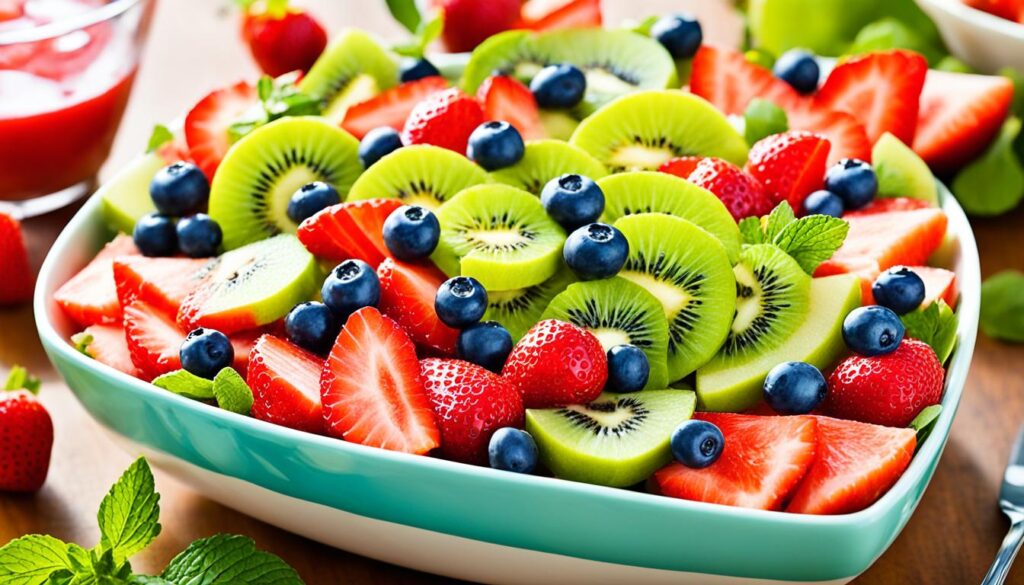
Fruit is nature’s candy – sweet, juicy, and packed with nutrients. It’s the perfect guilt-free indulgence.
Fresh vs Frozen The Eternal Debate
Walking through the produce aisle, you might wonder: fresh or frozen fruits? It’s a question of personal choice, convenience, and what best suits your family’s needs. We’ll explore the benefits and downsides of each option, helping you decide what’s right for you.
Preserving Nature’s Goodness
Fresh fruits catch our eye with their vivid colors and sweet smells. There’s something special about picking them fresh. Yet, time is quick to dull their luster. That’s where frozen fruits shine, keeping their nutrients and flavors intact year-round.
| Fresh Fruits | Frozen Fruits |
|---|---|
| Typically harvested at the peak of ripeness, retaining maximum flavor and nutrients. | Frozen shortly after harvesting often within hours, to preserve the nutritional profile. |
| Require careful handling and storage to maintain quality and prevent spoilage. | Conveniently stored in the freezer with a longer shelf life and reduced waste. |
| May be susceptible to bruising, wilting, or discoloration during transport and storage. | Expertly processed and packaged to prevent damage, retaining the original texture and flavor. |
This debate is all about what you prefer and need. Both fresh and frozen have their benefits. It’s about finding the right mix for you and your loved ones.
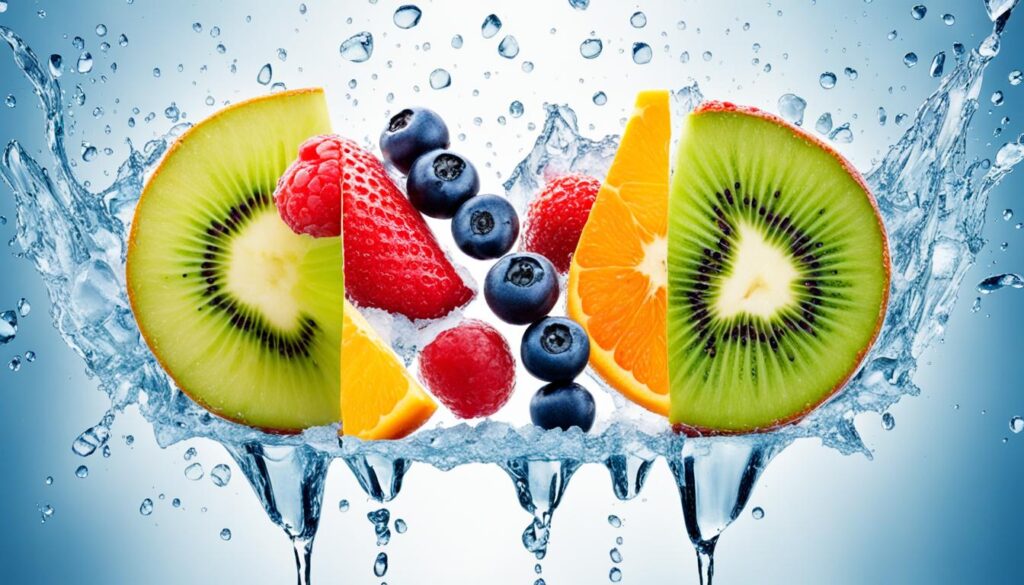
Frozen fruits are a convenient and nutritious option. Yet, fresh fruits are unrivaled for their taste and nature’s beauty.
No matter if you choose fresh or frozen what matters is getting a variety of fruits in your diet. They are full of fiber and very good for you. Try mixing them up to find what you enjoy most. This will help you stay healthy and happy.
Organic or Conventional The Great Fruit Dilemma
When choosing between organic and conventional fruits, consumers often find that decision tough. It’s important to consider the exposure to pesticides, nutrient content, and the impact on the environment. This helps us make choices that reflect our values.
Exploring the Pesticide Puzzle
Conventional fruits may have pesticides, causing worry about health effects over time. Organic fruits, however, are pesticide-free, helping to lower the exposure to harmful residues. But remember both types might have some natural pesticides.
Nutritional Considerations
Debates continue over whether organic produce is more nutritious than conventional produce. Some studies suggest that organic fruits have slightly more nutrients. But, these differences are usually small and might not matter for most people. The most important thing is to eat a variety of fresh, high quality fruits.
Environmental Impacts
In favor of organic produce is its potential to lessen environmental harm. This is because organic farming uses sustainable methods that help keep the soil and biodiversity healthy. But, the environmental impact of both farming types is complex and needs more thought.
Making the choice between organic produce and conventional produce is up to you. It should be based on what matters to you, your budget, and your priorities. Knowing the facts can help you make a choice that fits your values. This way, you can benefit from the health advantages of fresh, quality fruits.
| Criteria | Organic Produce | Conventional Produce |
|---|---|---|
| Pesticide Exposure | Reduced exposure to synthetic pesticides | Potential exposure to synthetic pesticide residues |
| Nutrient Content | Slightly higher levels of certain nutrients in some studies | Nutrient content may vary, but generally comparable to organic |
| Environmental Impact | Focuses on sustainable farming practices to preserve soil and biodiversity | May have a larger environmental footprint, depending on farming methods |
| Cost | Generally higher prices due to more labor-intensive farming practices | Typically more affordable for consumers |
Remember, eating a variety of fresh produce, whether organic or conventional, is key. It helps you enjoy the many benefits that fresh fruits bring to your health.
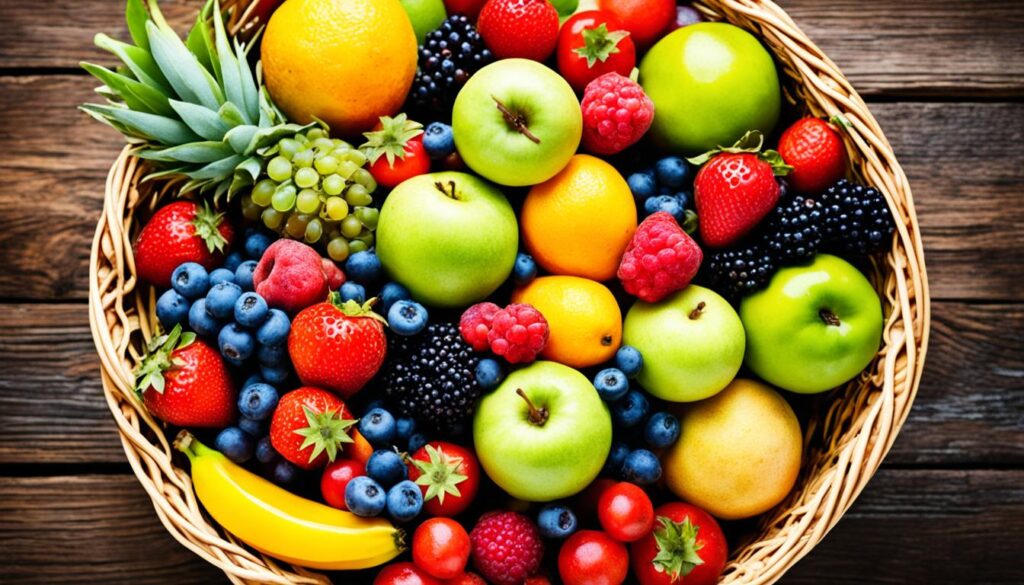
Incorporating Fruit into Your Daily Routine
Including more healthy fresh fruits and whole fruits in your day can be fun. It doesn’t have to be hard. With some imagination and a love for tasty foods, you can boost your fruit intake. This is great for breakfast, snacks, and even desserts. You’ll make your meals more balanced and nutritious.
Creative and Delicious Ways to Enjoy Fruit
Start mornings with a fruit-filled smoothie or add oatmeal topped with fresh berries to your menu. For a pick me up in the day, enjoy sliced apples with almond butter or a handful of grapes. Treat yourself with baked apples with cinnamon or a refreshing fruit salad as a dessert.
- Blend up a berry banana smoothie for a nutritious breakfast
- Top your oatmeal with sliced peaches and a drizzle of honey
- Dip strawberries in dark chocolate for a guilt free treat
- Freeze grapes or melon cubes for a refreshing and hydrating snack
- Bake apples stuffed with cinnamon and walnuts for a delightful dessert
With these easy and tasty ideas, you can meet your fruit goals. Enjoying fresh fruits and whole fruits this way is good for you. It’s full of fiber vitamins, and sweetness.
Fruit is nature’s candy, and it’s loaded with nutrients that are essential for a healthy, balanced diet.
So, let’s get cooking and use our imagination to eat more fruits every day.
Kid Friendly Fruity Delights
Getting kids to like healthy snacks is tough but doable. Parents can make it fun by serving fruits in cool ways. This turns fruit into a favorite for kids.
Want to get kids excited? Have them help with making snacks. Let them cut and put fruits on sticks, like a fruit kebab. They can mix fruits like strawberries and kiwis, or pineapples and grapes, to find what they love best.
Making smoothies or popsicles is also great fun. Kids can pick colors and add things like yogurt and honey. These snacks are healthy and tasty, making them better than sugary ones.
How you show fruit matters too. Make fruit flowers or shapes and fun skewers. This makes the food look inviting, and kids are more likely to eat it.
With a bit of creativity, fruits can become a snack kids love. It’s a great way for families to have fun and be healthy together.
Fruit Fusion Combining Flavors and Textures
Fruit is full of sweetness, colors, and textures that work well in many dishes. You can mix and match fruits with other healthy foods to make snacks that taste great. They’re also good for you.
Think about the taste explosion in a salad with strawberries, apples, and kiwi. Or enjoy the mix of a smoothie with banana, pineapple, and granola. There are so many ways to blend fruits, offering new tastes and experiences.
Ready to start mixing fruits with other yummy stuff? Here are a few ideas to spark your creativity:
- Mix sweet and tart fruits for a perfect balance, like berries with citrus.
- Play with textures, such as juicy mango, crunchy granola, and creamy yogurt together.
- Use herbs and spices to make your fruit dishes more interesting.
- Try new flavor combos, like the tasty mix of roasted figs with balsamic reduction.
With fruit fusion, you can boost the flavor and health in your snacks and meals. So, get playful and start this tasty journey with your snacks today!
Conclusion Embracing the Fruitful Life
Adding more fruit nutrition to your days is fun and good for you. Fruits give us lots of fiber and antioxidants. They help our bodies in many ways.
Do you want healthy snacks or to learn about dietary fiber? Fruits fit the bill. You can pick organic produce or go for usual types. The choices are wide open.
Let’s dive into the world of fresh fruits and antioxidant. It’s time to enjoy the mix of tasteful and nourishing bites. Adding some creativity can lead you to low-calorie options. This way, you really see the beauty in what nature gives us.





